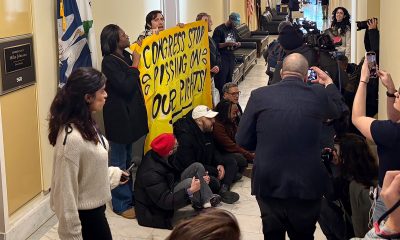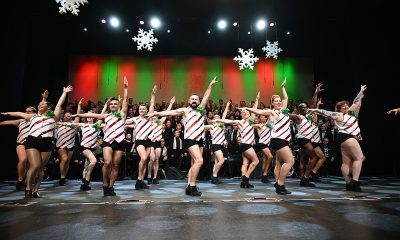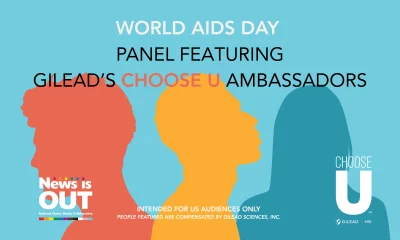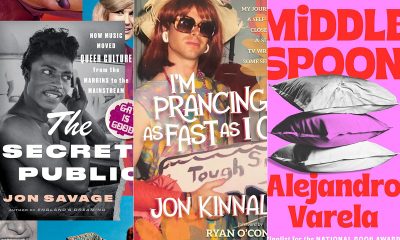Sports
Transgender Iraq vet competes in new arena
Ortega moves from the battlefield to pro bodybuilding
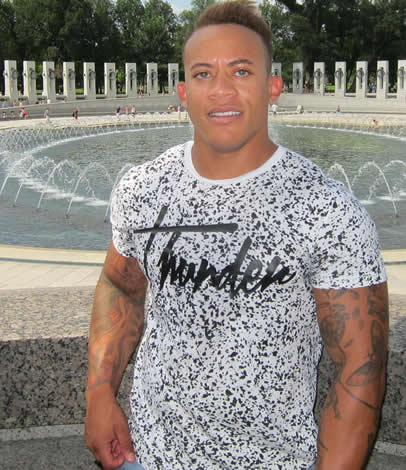
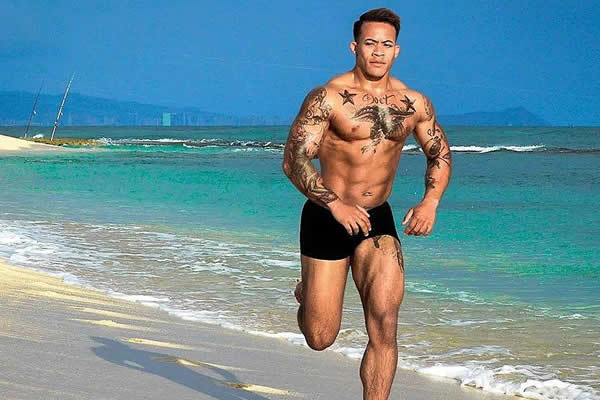
Sgt. Shane Ortega has served for more than 10 years in the military and is now an accomplished bodybuilder. (Photo courtesy ACLU)
When you first meet Sgt. Shane Ortega, the first things you notice are his muscles and tattoos. They are everywhere and it’s hard not to stare longer than the socially acceptable amount of time. Ortega is in D.C. for a series of briefings at the Pentagon and after multiple days of what he calls verbal ping-pong, he is ready to relax and do some sightseeing.
As he walks along the path next to the Reflecting Pool on the National Mall, each person that approaches from the opposite direction takes stock of him as they pass by. The reason they are looking isn’t because he is a trans man, they are looking at him because he has presence.
That presence has served him well during the past six years of quietly advocating for LGBT policy in the military. It began with work on the repeal of “Don’t Ask, Don’t Tell” and progressed into policy for transgender military service members. That advocacy has included meeting with civilians outside of the military chain of command such as politicians, the American Medical Association, SPARTA and the American Civil Liberties Union, among others.
“There is no road map for policy change,” Ortega says. “The timeline has accelerated since DADT and the people in power have refreshed. We are not the boogeyman anymore.”
Ortega just passed his 10-year anniversary in the armed forces and has been deployed twice to Iraq with the Marines as a woman and once to Afghanistan with the Army as a man. He is a Helicopter Flight Engineer in the Army’s 25th Infantry Division stationed at the Garrison base in Oahu, though elevated testosterone levels have relegated him to administrative work for the time being.
Throughout the course of this year, each of the military services has elevated its transgender separation policy outside of the military chain of command to third-party civilians. Just a few days after Ortega finished the last of his briefings, the Pentagon announced plans to lift the ban on transgender people serving in the U.S. military. After working in obscurity for years, Ortega is now one of the faces of the trans military movement.
The second thing you notice about Ortega when you meet him is that he is a ball of energy and he really likes to talk. As he treks toward the war memorials on the National Mall, his stories jump from music to scuba diving to his tours of duty to his uncles, all at breakneck speed. He is well spoken, engaging and funny. When he stops to admire the Vietnam Women’s Memorial, he mentions that he loves to sculpt things with clay.
The man knows a thing or two about sculpting other things as well.
Two months ago in Honolulu, he participated in his first physique competition and placed fourth, which qualified him for a spot at junior nationals in March of 2016. Sports and weightlifting had been a part of his regimen for years but it wasn’t until his body started filling out from hormone therapy that he began to think about competing.
Ortega was born in Maryland and moved around a lot growing up, living on bases with his mom or with family members while she was deployed overseas. He began wrestling in elementary school and picked the sport up again in high school along with track and field and soccer. After enlisting in the Marines he played intramural soccer and rugby on the bases.
A constant pursuit from sophomore year of high school on was weightlifting.
His high school wrestling coach started him out with the physiology of working out, which advanced to benching for form and finally lifting for bodybuilding. His heroes were the superstars of the World Wrestling Federation.
“I grew up with posters of Hulk Hogan and Randy Savage on my bedroom walls,” says Ortega. “I was into that good ‘ole American hero image.”
The weight training continued throughout his military career and escalated to a point where people were asking him if he was competing. After contacting the event organizers of National Physique Competition, Ikaika and the governing body to receive permission to enter the event, Ortega began serious training to compete in the men’s physique Class A.
Each morning started with physical training with his Army unit, the Hill Climbers, and included calisthenics and 15-25 miles of running per week. After work there were three to four sessions per week of weightlifting, two with a trainer. He says the hardest part of the preparation was starting the diet two months out from the competition and jumping to 300 grams of protein per day.
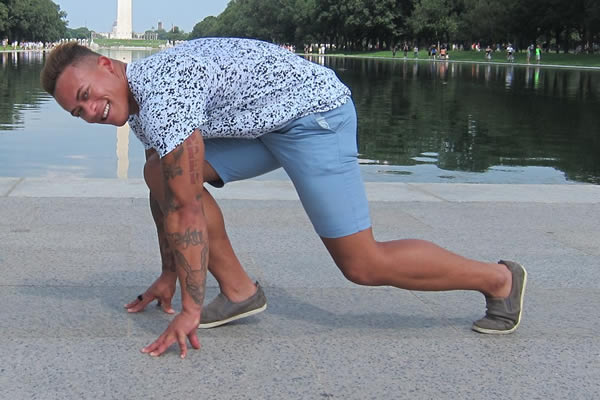
Shane Ortega (Photo by Kevin Majoros)
“I was really anxious the week before my competition. As the time came for me to compete, I realized how important it was for me as a trans man to compete at that level,” Ortega says. “Everyone was really nice and respectful at the event and I couldn’t have asked for a better experience for my first competition. It was a huge self-confidence boost.”
Ortega’s overall goal for the competition was to finish in the top three and qualify for nationals. He will attempt to accomplish that in his second competition at the Paradise Cup in September. “I believe that you can be anything you want to be in this country,” says Ortega. “If you want to become an elite athlete, find your opportunity and pursue it.”
As the day of sightseeing in D.C. winds down, Ortega begins to explain some of the tattoos on his body. He says they all have meaning to him. There is a woman wearing a gas mask, a grenade, nautical stars, Hindu goddesses and an Army tank.
When asked why the tank, he gets a huge grin on his face and exclaims, “Dude, there is an Army tank on my arm. How cool is that?”
Just like Sgt. Shane Ortega, that is in fact, pretty cool.
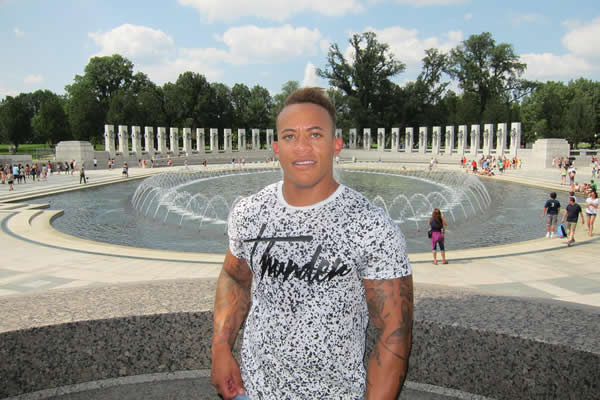
Shane Ortega (Photo by Kevin Majoros)
Egypt
Iran, Egypt object to playing in Seattle World Cup ‘Pride Match’
Game to take place on June 26

Iran and Egypt have objected to playing in a “Pride Match” that will take place in Seattle during the 2026 World Cup.
The Egyptian Football Association on Tuesday said it told FIFA Secretary General Mattias Grafström in a letter that “it categorically rejects holding any activities related to supporting (homosexuality) during the match between the Egyptian national team and Iran, scheduled to be held in Seattle, USA, on June 26, 2026, in the third round of the group stage of the 2026 World Cup.” Football Federation Islamic Republic of Iran President Mehdi Taj told ISNA, a semi-official Iranian news agency that both his country and Egypt “protested this issue.”
The 2026 World Cup will take place in the U.S., Canada, and Mexico. The draw took place at the Kennedy Center on Dec. 5.
Iran is among the handful of countries in which consensual same-sex sexual relations remain punishable by death.
The State Department’s 2023 human rights report notes that while Egyptian law “did not explicitly criminalize consensual same-sex sexual activity, authorities regularly arrested and prosecuted LGBTQI+ persons on charges including ‘debauchery,’ prostitution, and ‘violating family values.’” Egyptian authorities “also reportedly prosecuted LGBTQI+ individuals for ‘misuse of social media.’”
“This resulted in de facto criminalization of same-sex conduct and identity,” notes the report.
The 2024 human rights report the State Department released earlier this year did not include LGBTQ-specific references.
Soccer has ‘unique power to unite people across borders, cultures, and beliefs’
The June 26 match between Iran and Egypt coincides with Seattle Pride. The Washington Post reported the Seattle FIFA World Cup 2026 Local Organizing Committee decided to hold the “Pride Match” before last week’s draw.
“As the Local Organizing Committee, SeattleFWC26’s role is to prepare our city to host the matches and manage the city experience outside of Seattle Stadium,” said SeattleFWC26 Vice President of Communications Hana Tadesse in a statement the committee sent to the Washington Blade on Wednesday. “SeattleFWC26 is moving forward as planned with our community programming outside the stadium during Pride weekend and throughout the tournament, partnering with LGBTQ+ leaders, artists, and business owners to elevate existing Pride celebrations across Washington.”
“Football has a unique power to unite people across borders, cultures, and beliefs,” added Tadeese. “The Pacific Northwest is home to one of the nation’s largest Iranian-American communities, a thriving Egyptian diaspora, and rich communities representing all nations we’re hosting in Seattle. We’re committed to ensuring all residents and visitors experience the warmth, respect, and dignity that defines our region.”
The 2034 World Cup will take place in Saudi Arabia.
Consensual same-sex sexual relations remain punishable by death in the country. The 2022 World Cup took place in neighboring Qatar, despite concerns over the country’s anti-LGBTQ rights record.
Sports
Gay speedskater racing toward a more inclusive future in sports
Conor McDermott-Mostowy says anti-DEI push is driving away corporate sponsors
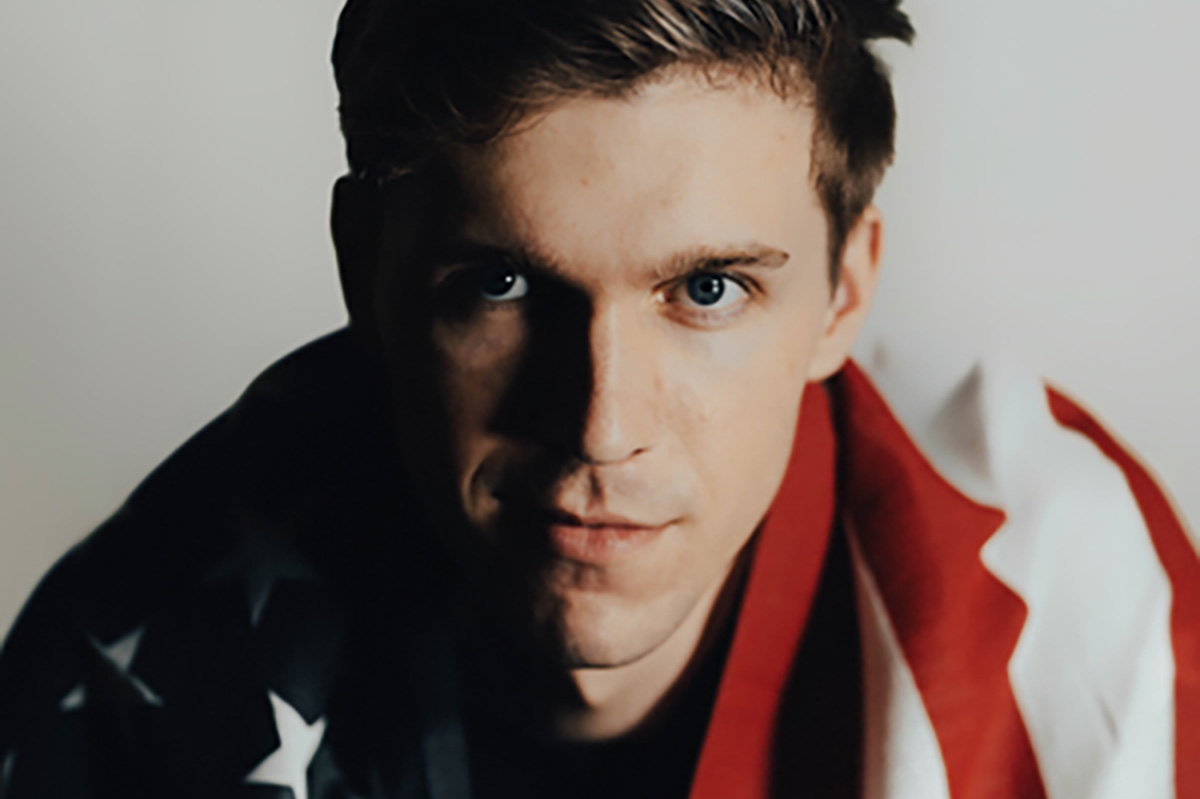
LOS ANGELES — As the countdown begins to the February Winter Olympic Games in Milan, Pride House LA is shining a spotlight on queer athletes who are breaking boundaries both on and off the field. Among them is Team USA speedskater Conor McDermott-Mostowy – a fierce competitor and proud member of the queer community. With blistering speed on the ice and a steadfast commitment to equity in sports, Conor is doing so much more than winning medals – he’s redefining what it means to represent one’s country while representing one’s community.
McDermott-Mostowy is one step closer to the 2026 Winter Olympics after winning the recent silver and bronze medals at the U.S. Championships in speedskating. He appeared at a Nov. 1 event presented by Out Athlete Fund/Pride House LA in the organization’s efforts to raise funds to support Conor and other out athletes as they pursue their Olympic dreams in Milan 2026 and beyond.The Blade spoke to the star athlete to talk about resilience, representation, and the legacy he hopes to leave one day.
Blade: Huge congrats, Conor! Winning a World Cup gold is no small feat. Do you feel like this win proved something to the world – or more importantly, to yourself?
McDermott-Mostowy: Winning gold with my team last year was definitely a major goal achieved. That said, the event we won isn’t yet an Olympic event. The races that have had the most profound impact on me actually happened two years ago.
The first was the team pursuit in Obihiro, Japan. I’d always been more of an alternate for that event, since it’s typically raced by skaters who compete in both the 1500m and 5000m. But I’d been itching for the opportunity to race it at the World Cup level. I finally got that chance when a teammate had to pull out at the last minute due to a back issue. We led the race through six of eight laps, ultimately finishing third. While it was a little disappointing to fall out of the lead, I was proud to prove that I could contribute meaningfully and help the team medal.
The second race was later that year in Salt Lake City, my home ice. After competing in Japan, I came down with a lung infection that affected my performance at the next few World Cups. Fortunately, I had time to recover before the North American World Cups and World Championships. At the Salt Lake City World Cup, I was balancing competition with completing my undergraduate degree. I didn’t know what to expect, but I ended up finishing fifth in the 1000m—my highest individual finish ever—and posted a time of 1:06.91. That’s a very significant time in speedskating; only three other Americans have gone under 1:07 in that event, all of whom became world champions. That result felt like a turning point, showing me that an Olympic or World Championship medal wasn’t just a dream—it was within reach.
Blade: This PrideHouse LA event is a huge moment. What does that support from the queer community mean to you?
McDermott-Mostowy: It’s incredibly meaningful. Being queer in Olympic sport can be very isolating, both inside and outside the sport. I barely have time to socialize outside of skating, and relocating to Salt Lake City doesn’t exactly help when it comes to queer community. So having that kind of solidarity and support from the wider LGBTQ+ community really means a lot.
Blade: Do you remember the moment you realized skating could take you all the way to the Olympics?
McDermott-Mostowy: There hasn’t been one single moment. It’s been a series of them. Over the years, I’ve had many races that shattered the limits I thought I had and inspired me to reach higher. That Salt Lake City race was one of them. It made me realize I shouldn’t just aim for the Olympics. I should aim for medals.
Another key moment came in 2018 at my last Junior World Cup, when my teammate and I finished 2nd and 3rd in the mass start. That event is similar to short track but held on a long track. It was my first full year focusing on long track after previously dabbling in it, and we had no expectation of medaling. But after we did, I realized I might actually have a future in this discipline—and that I could be competitive on the world stage. It was a pivotal realization, especially as I was trying to decide whether to continue skating or pursue a traditional college experience.
Blade: What initially drew you to speedskating? How did you get into the sport—and what’s kept you motivated?
McDermott-Mostowy: I grew up on skates. I started at age two and became a strong skater early on. But I never had any interest in hockey or figure skating. One winter, I was skating with my family on the C&O Canal in Washington, D.C., when a guy skated past us on these wild-looking speed skates. I was immediately intrigued. My parents found a local club, which happened to be run by three-time Olympian Nathaniel Mills, and I was hooked.
What’s kept me going is simple: I love it. This isn’t a sport you get rich in. I’ve only earned more than $20,000 a year twice in my career, and you can’t use it to pay for college either. The motivation has to come from within—the pursuit of excellence, the dream of going to the Olympics, and pure love for the sport.
Blade: What’s been your toughest race to date, and what did it teach you?
McDermott-Mostowy: That would be the team pursuit in Japan. I wasn’t expecting to race it and had already competed in a full weekend of events before getting the call. Team pursuit is arguably the toughest event in speedskating. Stepping up without being mentally or physically prepared was a challenge, but I did it. It showed me I could push through, even under extreme circumstances.
Blade: You’ve made headlines not just for your speed, but for your openness. What was it like coming out publicly in the world of elite sport?
McDermott-Mostowy: By the time I was publicly identified as gay, I had already been out to anyone who asked. So “coming out” doesn’t feel like the right term. It wasn’t a big declaration. I had the benefit of growing up seeing openly gay athletes and being part of a supportive community. I never felt the need to hide who I was.
Eventually, as I started achieving more on the ice, people began noticing me and the content I posted, and they put two and two together. When I was asked to speak publicly about being an openly gay athlete in speedskating, I didn’t hesitate.
Blade: What have been the biggest challenges in your career – physically, mentally, or otherwise?
McDermott-Mostowy: Honestly, my entire career has been about overcoming challenges. The two biggest obstacles have been illness and finances.
I’ve dealt with asthma, a norovirus that derailed my chances in 2022, and a fatigue condition last season that affected my performance. These setbacks take a toll. Not just physically, but mentally. When you invest everything into your sport, being forced to pause or scale back is a huge emotional hurdle.
Financially, speedskating is a tough path. Even as a consistent top-20 skater in the world, I’ve only broken $20k twice in a year, and we’re paid for just nine months, even though we train year-round. I’ve leaned on friends and family for support many times just to make ends meet.
Blade: Have you ever been told – explicitly or implicitly – that being openly gay could hurt your chances with sponsors or coaches?
McDermott-Mostowy: Never with coaches. In our sport, selections are based on the clock, not someone’s opinion. My coaches have always been great.
But when it comes to sponsorships, especially over the past year, I’ve noticed a shift. As anti-DEI sentiment grows, brands are backing away from anything that could be seen as “controversial.” Being openly gay seems to fall into that category now. Since most of our income comes from sponsorships, that retreat is deeply felt.
Sports
Trans cyclist’s victory sparks outrage in conservative media
Katheryn Phillips is originally from DC
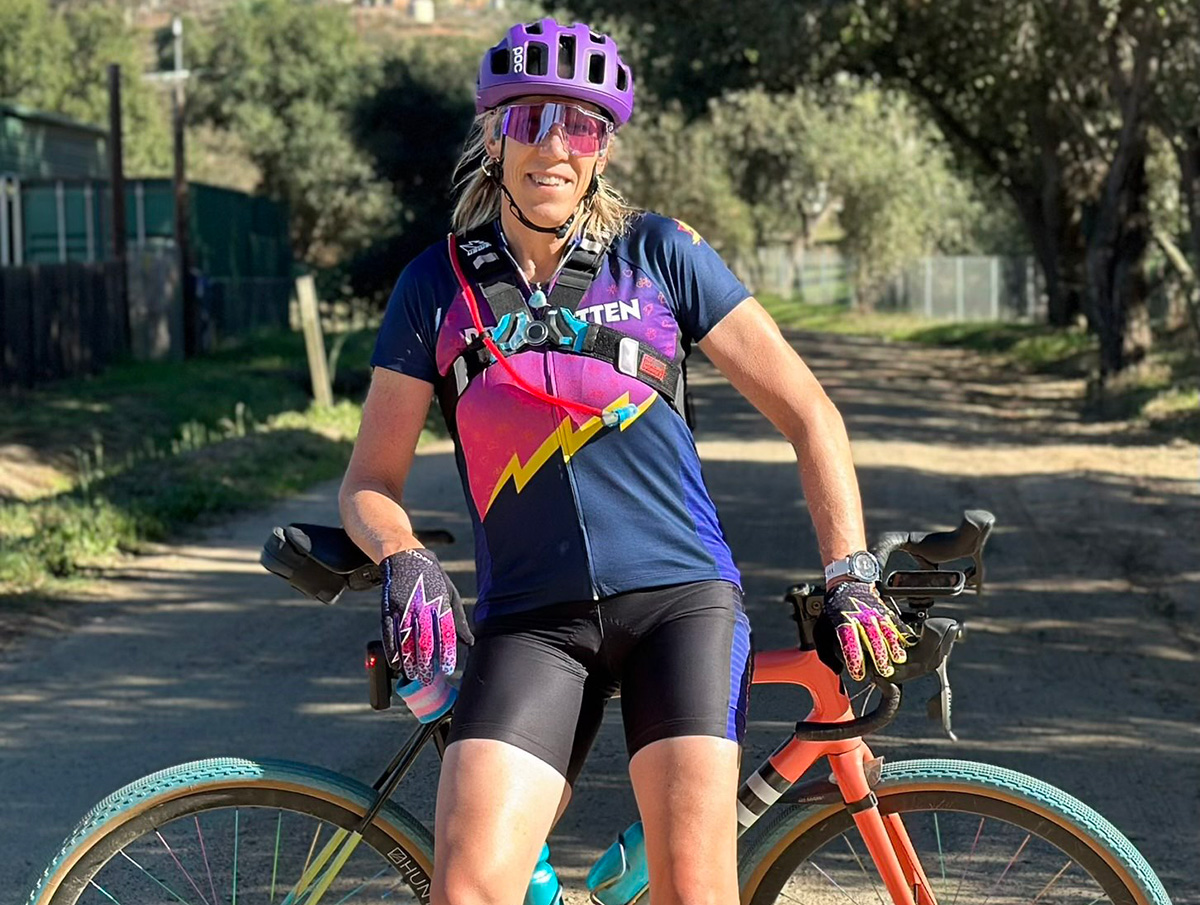
On the heels of UPenn erasing the record of the first openly transgender NCAA Division I All-American swimmer and the U.S. Supreme Court’s decision to tackle bans on trans student-athletes, right wing media is now all hot and bothered about the latest trans woman who won a cycling championship — even though she competed according to the rules.
On Tuesday, 58-year-old Katheryn Phillips finished first in USA Cycling’s Lyons Masters National Championship race for women aged 55-59, with a time of 1:42:10, according to the official results posted by the organization. The record shows her gender as “F” for female.
One second behind Phillips was Julie Peterson, with a time of 1:42:11 — as were three other cyclists: Mary Beth Grier, Andrea Cherniak-Tyson, and Carolyn Maddox.
Peterson, 57, was so outraged, she told Fox News she refused to stand on the podium in second place next to Phillips. Her story was swiftly shared by the New York Post (also owned by Fox’s parent company News Corp.), the Daily Mail, Breitbart, and other conservative media.
Both Peterson and another competitor are accusing USA Cycling of “hiding” that a transgender woman had registered to race.
“It was hidden from us. Katheryn Phillips, KJ’s name, was not on that list. And I checked it up all the way to the point of closure when we couldn’t register online anymore,” Debbie Milne told Fox.
“If I had known, I wouldn’t have spent thousands of dollars in travel and time off work to come and do a race,” Peterson said. Fox welcomed Milne, 56, who finished seventh on Tuesday, to Fox & Friends Thursday morning.
(Video courtesy of Fox News)
Peterson told Fox she did complain to USA Cycling officials prior to the race. Both Milne and Peterson referred to Phillips as a male, and with “he/him” pronouns.
“To be fair to all humans, if we want to say ‘him’ or ‘her,’ he was born a biological male, that is a fact,” Milne said. “And that is the thing that makes it an unfair advantage. Whatever has happened after that is a whole different topic.”
“I said, ‘I don’t want to race against a man,’ and they quickly scolded me and said ‘Oh, you can’t call him a man,’ and I’m like ‘Well, he is a man,’ so I was quickly scolded and corrected that it is a woman and I don’t even know what to say.”
USA Cycling did not respond to the Washington Blade’s emails requesting comment.
Phillips, who goes by Kate and by “KJ,” is a former rugby player with the D.C. Furies, who stated in the comments of a 2024 article published by Zwift Insider that she was the first out trans athlete in the U.S. to compete under the 2004 International Olympic Committee’s guidelines on trans participation.
“When USA Rugby told me about the IOC decision in 2004, I raised my hand to be included. I experience nothing but joy when I play, ride, and race,” Phillips said.
As the Blade has reported, the International Olympic Committee drastically revised those rules in 2021, and in March, Republican lawmakers in D.C. demanded the IOC ban trans female athletes from women’s sporting events altogether.
The Blade also reached out to Phillips for comment but as of press time we have not received a response. She told Zwift Insider in March 2024 she does not let those who disapprove or spread hate impact her performance or her attitude.
“I am unaffected by dissent. I love, I share joy, I am me, and I have been my authentic self for decades,” she said. It’s been reported Phillips came out in 1999, and told Zwift Insider she considers herself a lifelong cyclist.
“I’ve been on a bike for as long as I can remember,” said Phillips. “As kids, my friends and I rode all over town, we were feral kids; no cell phones, no trackers … we just roamed, and nobody got in trouble or hurt bad enough not to ride home … Scrapes/bruises/cuts were not an issue for us. In my teens, I worked for myself as a court/legal messenger, doing all of the work via my bike until I got a car. Raced BMX as a kiddo (when I mowed lawns to cover the race entry fees), I did MTB stuff (non-racing) and Sprint/Olympic Triathlons in my 30’s, and now I’m racing on Zwift, Road/Gravel, and CX in my 50s.”
In the comments section, Phillips made clear she’s not competing to win.
“I don’t do sports for victory, I do it because like many other women, I am an athlete to my core,” she said. “Unlike some, I am not there to WIN, I am there to do my best with the competitors and teammates I have around me trying to do the same…we are in it for the experience. I rejoice in their wins, and a lot of joy is reflected back to me when I have a good day.”





